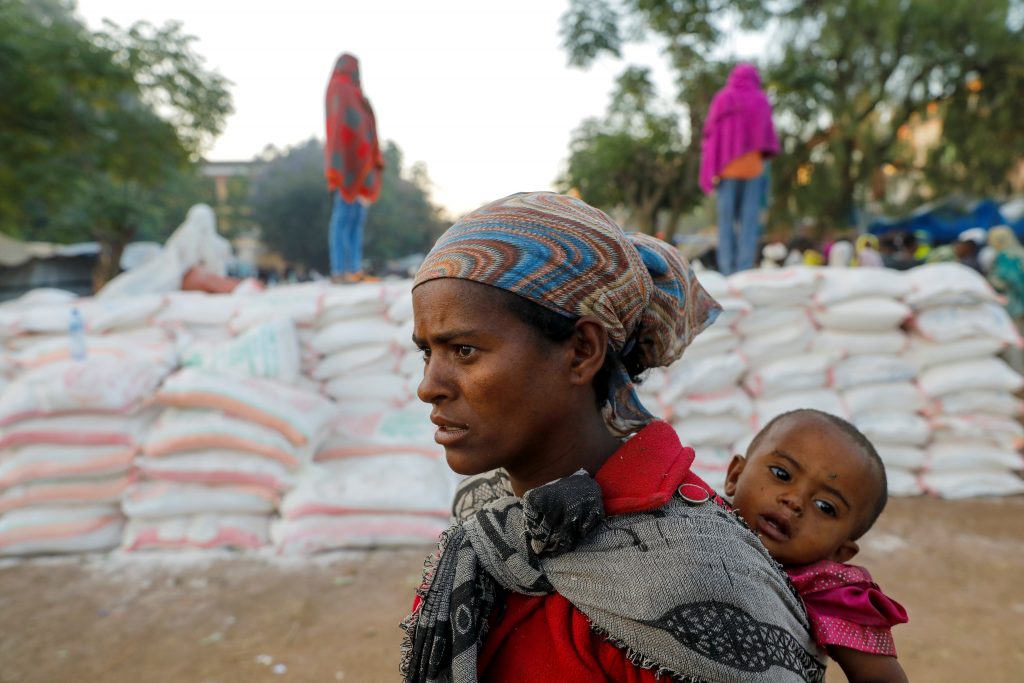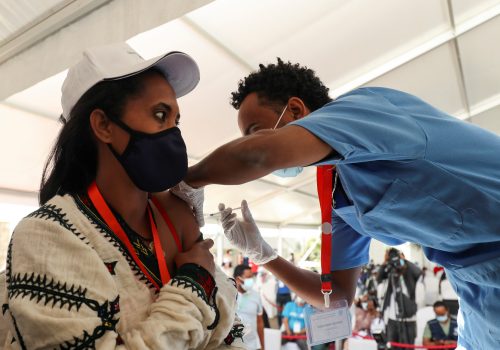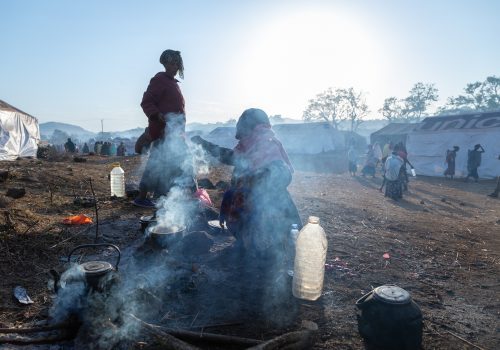For months, the Biden administration warned that it would sanction the Ethiopian government and its allies for the human-rights abuses, war crimes, and other mass atrocities they have allegedly committed in their year-long war with the Tigray People’s Liberation Front (TPLF). As the nationalist group has carried out its own reprisal killings, those warnings have expanded to include all parties to a conflict that’s left thousands dead and nearly one million people languishing in famine-like conditions.
Then came today’s executive order—the latest in a long series of escalatory efforts by the White House to push the belligerents toward ceasefire talks and to allow in humanitarian aid. Repeated press statements expressing the administration’s “grave concern” looked more like platitudes than policy, which is why it faced increasing pressure from human-rights activists to act.
The administration chose to issue what the Treasury Department calls an “empty EO,” meaning a sanctions regime is now in place but the executive order does not designate any individuals or companies. Instead, the Biden team has launched its final and most elaborate warning shot, effectively giving both sides a few more weeks to engage in serious negotiations, cease their attacks on civilians, and open up the free flow of humanitarian assistance before sanctions are imposed. US officials have been clear to say that designations will come “in weeks not months” if progress isn’t made quickly.
The order goes further than sanctioning only human-rights offenses, as is allowed under the Global Magnitsky Act. Instead, the order is purpose-built to create a sanctions regime specific to the conflict in Ethiopia, giving the administration broad authority to target asset freezes at not just those committing rights abuses, but also those blocking humanitarian aid, inhibiting ceasefire negotiations, undermining democratic processes, engaging in corruption, and targeting civilians and international aid workers.
While we don’t know who will be targeted, it will likely include a representative sample of all the warring sides, including Ethiopian and Eritrean government officials, Amhara state representatives and militia leaders, as well as Tigrayan political and military figures.
Abiy under fire?
If the United States chooses to sanction Prime Minister Abiy Ahmed and his close associates before his expected reappointment as prime minister in the coming weeks, it could plant serious doubt about his leadership in the minds of his supporters. Such a move—though it’s unlikely—would probably also be met with renewed accusations that the United States was meddling in Ethiopia’s internal political affairs and effectively seeking regime change.
Because Washington has been accused of taking sides against Addis Ababa, today’s order takes great pains to appear even-handed by recognizing the complicity of all sides in committing rights abuses and prolonging the conflict. The order singles out not just Ethiopian and Eritrean government officials but also “the TPLF, the Amhara regional government or the Amhara regional or irregular forces,” essentially any party alleged to have committed abuses to date.
In a smart move, the administration also rolled out wide carveouts to those sanctions for “personal remittances to non-sanctioned persons, humanitarian assistance to at-risk populations, and longer-term assistance programs and commercial activities that address basic human needs.” That suggests it has learned from past cases, in which broad unintended consequences followed sanctions by hurting civilians.
Beyond the direct effect of sanctions, the reputational effect associated with them will also likely be substantial. Ethiopia will now be associated with neighbors such South Sudan and the Central African Republic on the Treasury Department’s Office of Foreign Assets Control (OFAC) list of sanctioned countries—company it will surely not want to keep when just two years ago it found itself on a very different list: the International Monetary Fund’s ranking of the world’s fastest-growing economies.
Although today’s announcement is a serious step forward on pressuring the Abiy government, it still leaves open the possibility that progress on the ground can be made over the next several weeks and that the worst of Washington’s sanctions can be avoided.
Timing is everything
As fighting has become increasingly widespread over the last few months, many fear the war could quickly escalate and get dramatically worse for non-combatants, who have borne the brunt of the violence.
Moreover, East Africa’s rainy season will end in a few weeks, allowing for heavy weapons and larger troop deployments to wider, previously unreachable swaths of the country. While the TPLF currently appears to be on its back foot, the coming start of the dry season will level the battlefield once again. US officials estimate that all sides are preparing major new offenses next month.
Ethiopia will also be concluding parliamentary elections, which were delayed this summer in several regions due to the fighting. This will be followed almost immediately by a party congress for Abiy’s Prosperity Party, which he hopes will not only renew his mandate but also give him support to press forward with the war. To that end, the Biden administration’s order leaves Abiy with a choice: Use that new mandate to push for total victory, or initiate some type of political settlement.
Lastly, coming just days before the start of the United Nations General Assembly—and as former Nigerian President Olusegun Obasanjo heads to Ethiopia as the African Union’s new Horn of Africa envoy—today’s effort could catalyze a new and concerted international diplomatic push for ending the fighting.
All sides have expected this announcement for some time. Still, US-Ethiopia relations are sure to nosedive even further as a result. Just hours after today’s sanctions announcement, Abiy issued an open letter to US President Joe Biden in which he stridently proclaimed that “Ethiopia will not succumb to consequences of pressure engineered by disgruntled individuals.”
However, viewed from Washington, diplomacy alone hasn’t worked either. The question is whether Abiy will see this latest move from Washington as the end of the road—or as an exit ramp to avoiding even greater pain.
Cameron Hudson is a nonresident senior fellow with the Atlantic Council’s Africa Center. Previously he served as the chief of staff to the special envoy for Sudan and as director for African Affairs on the National Security Council in the George W. Bush administration. Follow him on Twitter @_hudsonc.
Further reading
Image: A woman carries an infant as she queues in line for food at the Tsehaye primary school, which was turned into a temporary shelter for people displaced by conflict, in the town of Shire, Tigray region, Ethiopia, on March 15, 2021. Photo by Baz Ratner/Reuters.



